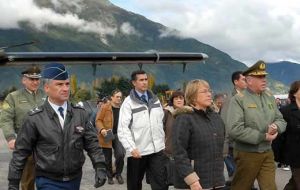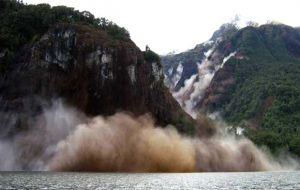MercoPress. South Atlantic News Agency
Chile: Govt orders fish farms to evacuate quake region
 Pte. Michelle Bachelet visited the area
Pte. Michelle Bachelet visited the area One way or another the salmon farms currently operating in the Aysén Fjord (Region XI) must be relocated, President Michelle Bachelet told reporters on Tuesday, three days after a 6.2-magnitude earthquake struck the area, killing at least 10 people — several of them salmon farm workers.
"This can't wait," said Bachelet. "We're going to make this happen either by convincing people to cooperate on their own, or by taking appropriate legal measures, because (protecting) lives comes first." Saturday's earthquake, which lasted approximately 30 seconds, struck just before 2 p.m., causing panic among the area's already jumpy residents and producing major landslides around the Aysén Fjord. The landslides, in turn, created a series of huge waves that leapt up along the shoreline of the Fjord, destroying piers and houses, and sweeping 10 people into the water. Authorities have since discovered the bodies of three victims. Funeral services were held Tuesday in nearby Puerto Aysén. Seven others â€" among them four salmon farm workers â€" are still missing and presumed dead. Scientists believe Saturday's quake â€" the latest in a prolonged, three-month barrage of seismic activity likely being caused by a subterranean magma flow â€" originated at a point directly below the Aysén Fjord. The magma, which is pressuring a subterranean tectonic plate, could eventually push its way to the surface and form a relatively small volcanic cone on the floor of the Fjord, according to experts. As the recent tragedy demonstrated, the recurrent quakes are particularly dangerous for people working in the 14 salmon farms that currently operate inside the Aysén Fjord. In order to prevent further loss of life, the government has asked that the farms â€" owned by the companies AquaChile, Pescachile, FrioSur, Salmones Antártica and Salmones Cupquelán â€" move their operations elsewhere. Operations on the farms, many of them severely damaged by the quake and subsequent "mini tsunami," are currently suspended. Industry representatives, however, are insisting that before they pull up stakes for good, they would first like more detailed information about precisely which parts of the Fjord are most at risk. "Obviously we're looking into carrying out (the evacuation). We're more than willing to cooperate in terms of evacuating the zone â€" something we've already been doing the past few days," Rodrigo Infante, general manager of SalmonChile, told Radio Cooperativa. Nevertheless, "They still need to define what exactly is the danger zone," he added. "Are we talking about the whole fjord, or just one part of it? That's one of the things we need to discuss with the authorities, especially with the seismologists." A permanent evacuation of the fjord would no doubt be costly for the salmon companies operating there, especially for Pescachile and Friosur, which also operate salmon production centers in nearby Puerto Chacabuco and therefore enjoy relatively low transport costs. In terms of losses already suffered by the companies, no concrete figures have yet been released. "We're not concentrating on doing that just now," said Infante. "Obviously, because of the wave, there was damage done to the physical infrastructure of the farms. We're working on that, but (calculating losses) hasn't been our top concern." The Santiago Times





Top Comments
Disclaimer & comment rulesCommenting for this story is now closed.
If you have a Facebook account, become a fan and comment on our Facebook Page!